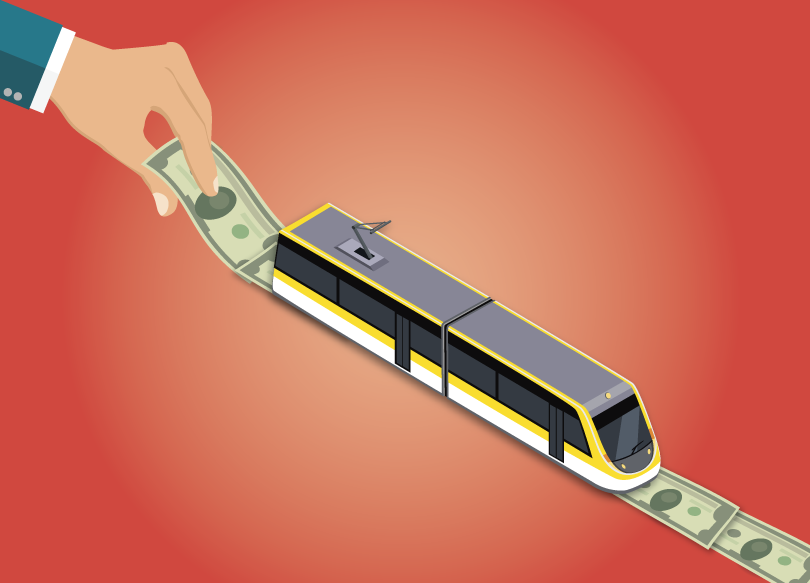
Illustration by 355A

Audio By Carbonatix
The implementation of drastic changes to Dallas Area Rapid Transit (DART) bus routes and light rail frequency remains unknown, as the transportation system’s board chose to delay a final decision on the proposed changes in a last-minute vote at Tuesday’s scheduled committee meeting.
The board was scheduled to vote on a package of changes that would amount to the largest service changes in DART’s 40-year history. Some of the initial changes, like nearly doubling the cost of paratransit services and reducing the paratransit service zones, were scrapped earlier this month. However, on Tuesday night, the board did approve increasing curb-to-curb paratransit fees by 50 cents to $4 per one-way ride and increasing the cost of a single-ride standard ticket from $3 to $4.
The board gave itself a few more weeks to decide whether to eliminate certain bus routes and limit other fixed-route frequencies, delaying the final vote to the next regular board meeting on Sept. 9. According to Rob Smith, vice president of service and planning, the two-week delay will cost DART an estimated $1 million. The changes, if adopted, were slated to launch in January 2026, but implementation has also been delayed.
The delay was approved in an 8-7 vote in order to give member cities more time to assess the impacts of service changes.
“We have meetings with all of the cities in two days to talk about the budget,” said Director Randall Bryant. “The cost of delayed implementation, for me, it’s not an exclusion. It’s a point of consideration.”
Earlier this year, in March, while a bill moved through the legislature that would have fundamentally restructured DART’s funding system and created an estimated several billion dollars in annual losses, the board released a new general mobility program (GMP), which included the proposed changes as a money-saving measure. The bill, which eventually failed, would have allowed the transit service’s 13 member cities to elect to reduce their one-cent sales tax contributions by a quarter, fully derailing ongoing and future improvements to DART.
“We don’t have enough money to do everything,” said board chair Gary Slagel at Tuesday’s meeting. Increased demands and requests in cities wanting equitable services matching their contributions were part of the inspiration for some of the changes, according to the DART website.
The Lesser Of Two Evils
In a series of meetings hosted throughout the summer leading up to a July public hearing, DART representatives continuously described the changes as the “worst-case scenario” and said any combination of the changes could be implemented or abandoned.
Hundreds of North Texans packed into the DART headquarters for the hearing to express their discontent with the proposed changes. The meeting, which had several overflow rooms as capacity was reached early, lasted well into the night, and local transportation advocates have remained anxious since then, hopeful that the board would listen to reliant riders and release a decision sooner rather than later.
“If there is some magic way to do [this] without cutting some important part off, sure, I’m open to it, but I don’t know if we’ll find that in time,” Tyler Wright, vice president of the Dallas Area Transit Alliance (DATA), said to the Observer. “We’ve been doing this for the past year. Let’s get this passed so we can focus on what we need next. We’ve got a whole two-page sheet of suggestions for things we can advocate for that we’re ready to get in on.”
Wright and several of DATA’s members spoke before the board at Tuesday’s meeting. They also attended a number of prior meetings about the GMP. But as the board has dropped certain changes and clarified their plans, DATA has changed its tone, accepting that change is necessary for the transit service to stay afloat.
“When we found out that service cuts, regardless of the GMP, the ones they’re proposing, were going to happen… that changed things for us,” said Wright. “Service cuts are happening anyway. The really essential stuff, like new trains and new buses, is not affected by this.”
DATA is not necessarily enthused by the changes, but it’s willing to cut its losses so long as it means DART continues to serve North Texas. The hope is that the system can continue to introduce new offerings and improve old ones, while also keeping the city of Plano and its House Rep. Matt Shaheen at bay. Plano, over the last few years, has spearheaded pushback to DART’s funding system, and Shaheen, on their behalf, has continuously filed bills that would allow Plano and other cities to contribute significantly less.
“DATA does not support the GMP, but we accept it,” Wright said. “We’re not excited about it, but we’re okay with it as long as it protects DART from future existential threats of that same nature that we saw [during the 89th Legislative Session.”
Initially, DATA’s knee-jerk response to the changes was outrage. But Wright says the organization has refocused, understanding that something needs to be done. If two years of improved but lesser service is the trick to avoiding another battle in the next session, then so be it.
“There’s another argument that could be made that if they just run an excellent agency for two years, there’s less of a case for cuts.”
Wright noted that Dallas is one of the few cities to increase transit services post-COVID, and says that ridership has only increased since then.
“Ridership is up. Big cities cut revenue service, DART added more,” he said. “If these people could just get out of the way so [DART] can focus on running a good agency and getting more riders, that’s the goal. If this keeps DART safe, we’ll take it. For now, I think they did their best to keep the service cuts down to something that is not great, but not catastrophic.”